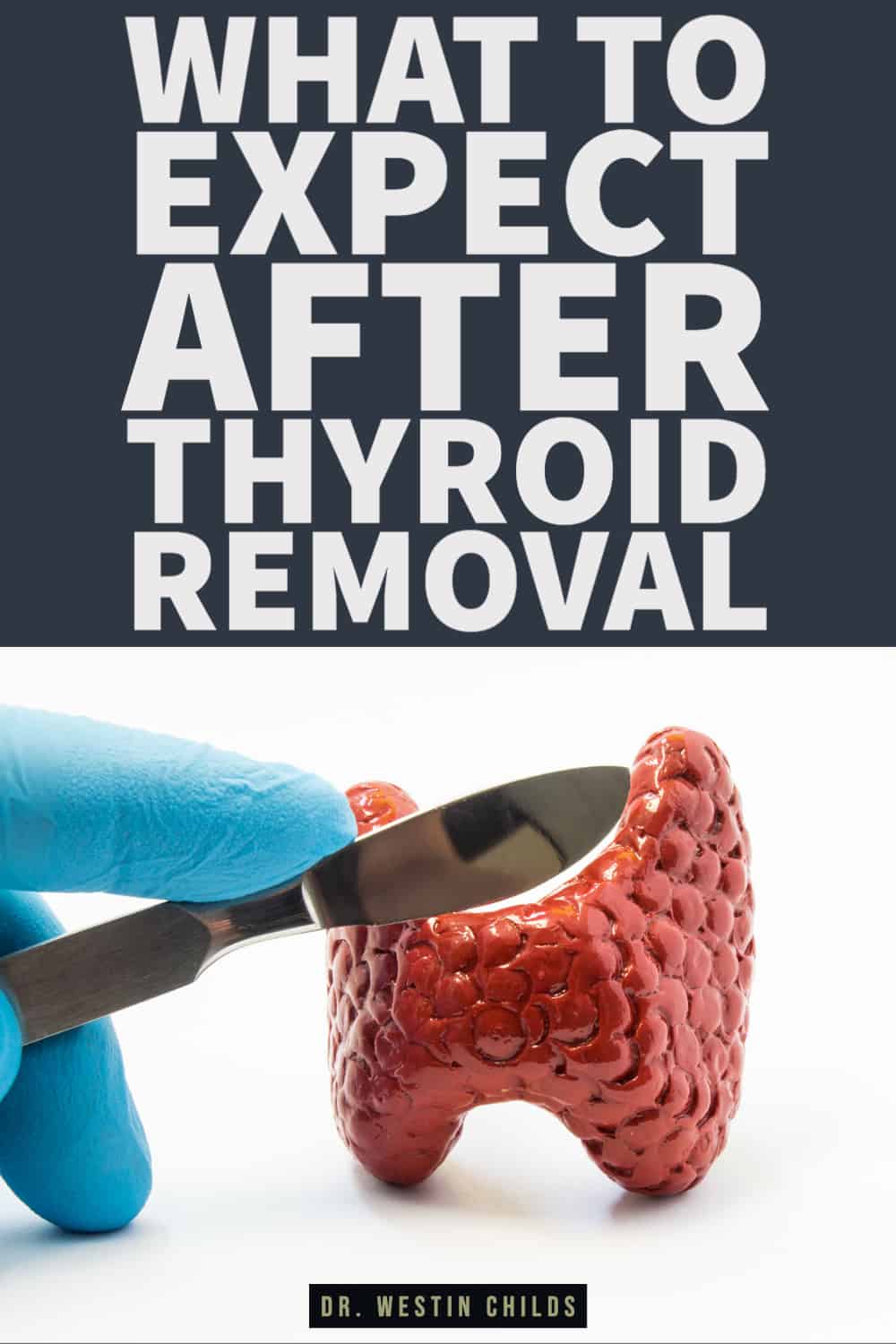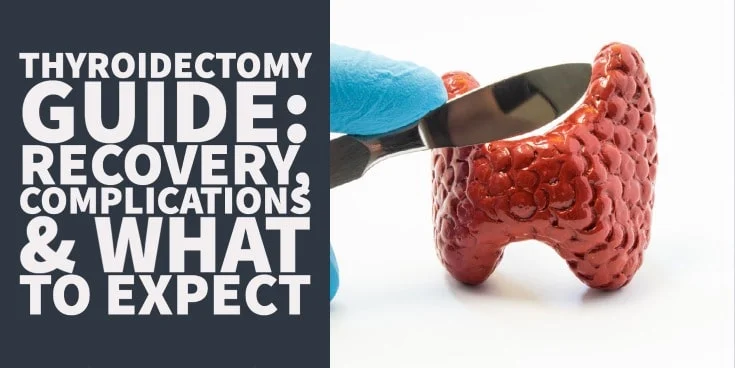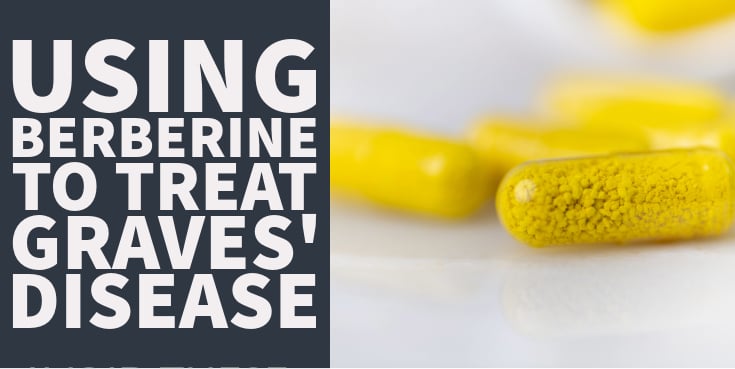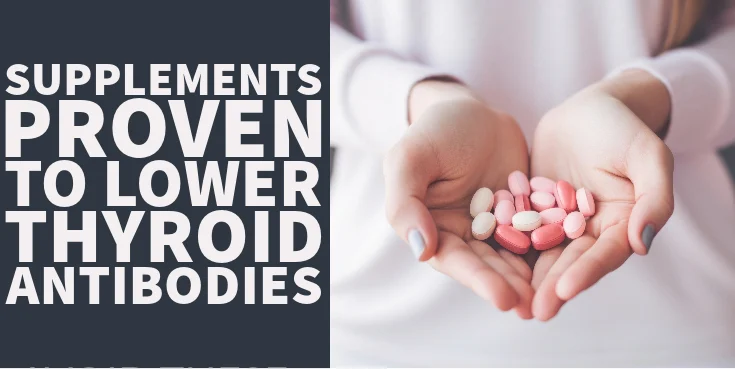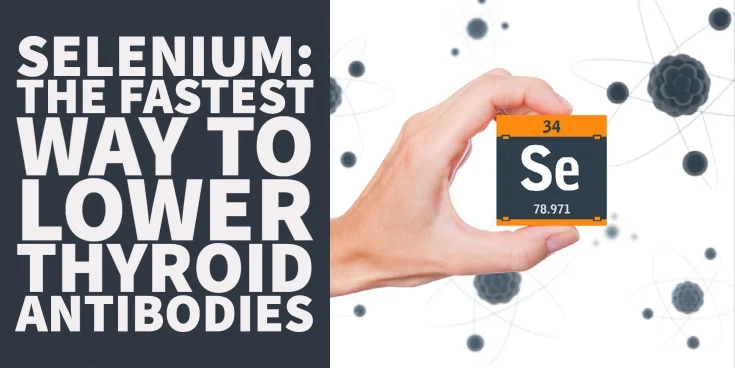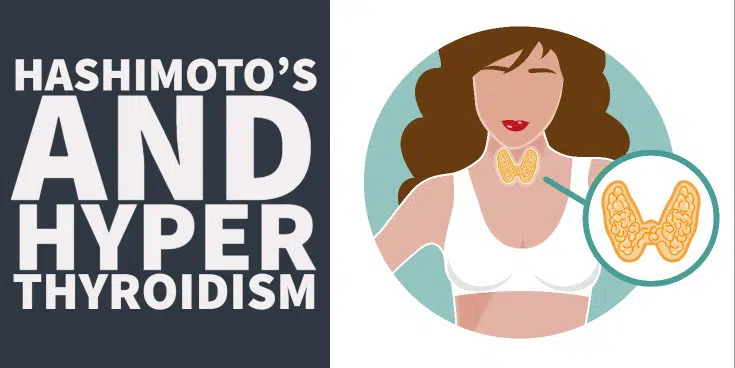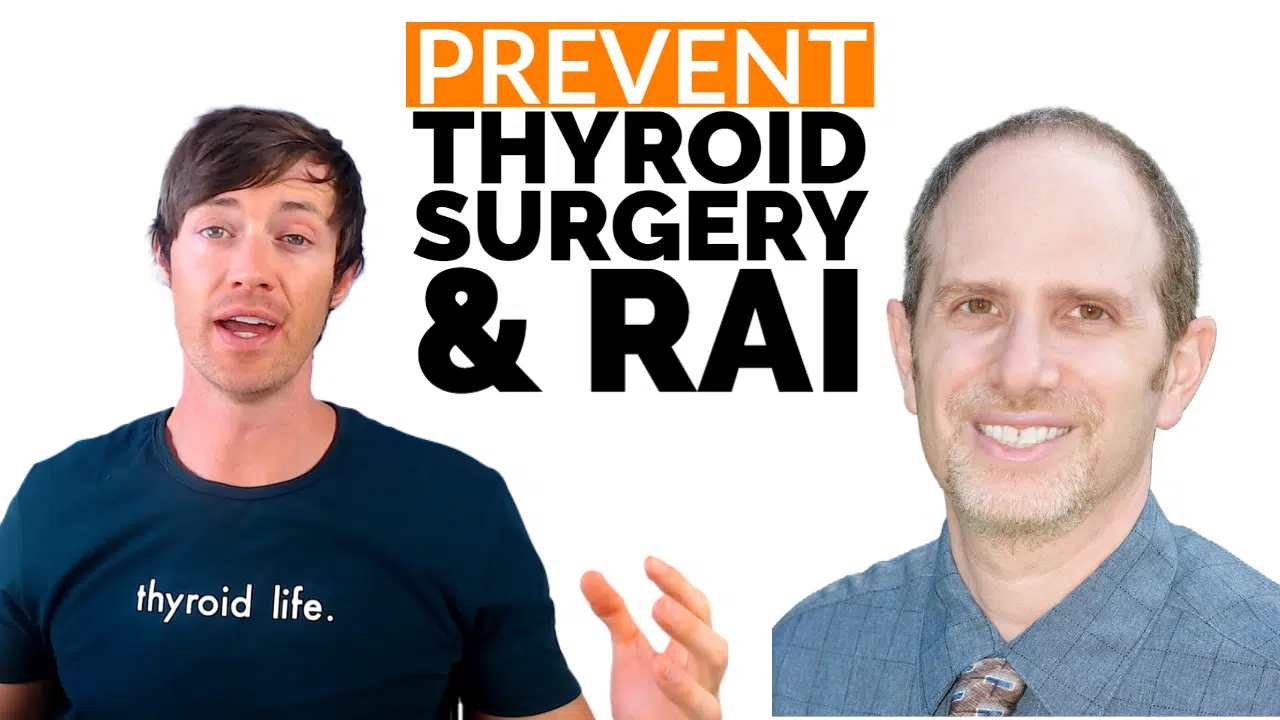Thyroidectomy refers to the surgical procedure in which your thyroid is removed.
While the surgical portion of the procedure is usually fairly easy, the aftermath as it relates to your serum thyroid levels may be a different story entirely.
Learn more about Thyroidectomy in this guide, including the basics of the procedure, the long-term consequences of having your thyroid removed, information on the recovery side of things, and how to feel like yourself after the procedure:
Thyroidectomy Basics
If you are reading this post then chances are high you either have gone through a thyroidectomy or it has been recommended as the next step in your treatment.
In either event, you are in the right place.
In this post, we will dive into the basic and more complex aspects of getting a thyroidectomy.
One of the major issues with getting a thyroidectomy is that it is treated as a routine procedure similar to getting your appendix removed.
From a surgical standpoint, this is definitely true (1).
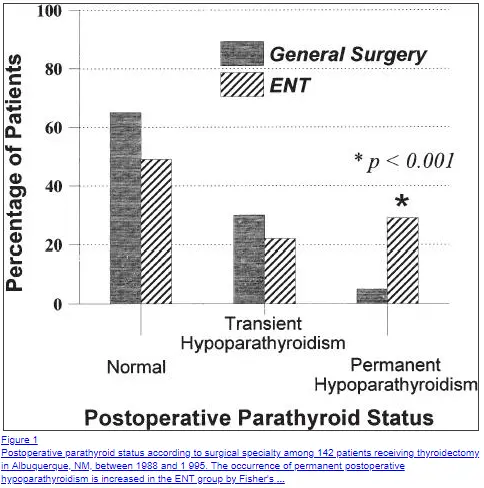
But from a hormonal standpoint, this couldn’t be farther from the truth.
And one thing you may not realize, walking into the procedure, is that no matter how hard you try you will never experience “normal” thyroid levels again after your thyroid is removed.
Much of this has to do with how complex the thyroid system is in your body.
Your thyroid pumps out thyroid hormone based on the demand of your tissues all the time.
Your body is converting T4 into T3 based on the needs of the tissues and it has the ability to either slow down or speed up thyroid hormone production based on the needs (3) of your body.
But once you remove your thyroid, the ability to tightly control and regulate your thyroid is gone.
Instead, you will be placed on thyroid hormone medication (usually once per day) and told that this will be enough to control your thyroid.
While it may be enough to keep your lab tests in the normal range, it may not be sufficient to keep you at an “optimal” level.
Because of this, it’s not uncommon for patients, post-thyroidectomy, to experience side effects such as weight gain (on average 10-20 pounds), depression, hair loss, and so on (4).
We will discuss these topics in detail below, but for now, just realize that they do exist and they may be a “complication” that some patients experience.
But back to thyroidectomy basics for a minute…
The term thyroidectomy is the name of the procedure which is used to describe the surgical operation that completely removes the thyroid gland from your body.
The surgical procedure itself is fairly straightforward provided you have a good surgeon doing the operation.
There are a few potential side effects related to the surgical procedure itself (such as damage to certain nerves or the potential for the removal of your parathyroid glands) but most people do not have issues with these.
Instead, the complications tend to come afterward when thyroid hormone replacement is initiated.
DOWNLOAD FREE RESOURCES
Foods to Avoid if you Have Thyroid Problems:
I’ve found that these 10 foods cause the most problems for thyroid patients. Learn which foods you should avoid if you have thyroid disease of any type.
The Complete List of Thyroid Lab tests:
The list includes optimal ranges, normal ranges, and the complete list of tests you need to diagnose and manage thyroid disease correctly!
Who should get a Thyroidectomy?
Thyroidectomy is often recommended for patients who suffer from diseases that cause hyperthyroidism.
Conditions such as Graves’ disease or toxic multinodular goiter are common diseases that may warrant the removal of your thyroid gland.
Patients who have hyperthyroidism may have alternate options, instead of getting a thyroidectomy, such as taking anti-thyroid medications or radioactive iodine ablation.
Some other disease states, such as thyroid cancer, do not leave many options in terms of treatment.
Patients with thyroid cancer should undergo a thyroidectomy because, in most cases, it allows for the complete removal of cancer cells in your body.
Some other conditions such as goiter (enlargement of the thyroid gland) or multiple nodules may also warrant a thyroidectomy, but these are not as common as the other disease states listed above.
The main idea here is that you don’t want to get a thyroidectomy unless it is absolutely necessary for your body.
If you have other options, such as the use of medications, it may be wise to consider these therapies prior to getting a thyroidectomy.
Occasionally, thyroidectomy is recommended as a surgical option for treating hyperthyroidism simply because it is felt to be easier to manage hypothyroidism with medication as opposed to hyperthyroidism.
This may work for some people, but for many others taking out their thyroid prematurely may cause more harm than good.
As always, this should be evaluated on a case-by-case basis.
Thyroidectomy Recovery & Side Effects
What can you expect in terms of recovery after your thyroidectomy?
The first thing to realize is that after your thyroid is removed you will be reliant upon thyroid medication for the rest of your life.
Once your thyroid is removed your body is no longer capable of producing thyroid hormone in any real capacity.
This means that you must supplement with thyroid hormone replacement medications such as levothyroxine and Synthroid, for the rest of your life.
And this is incredibly important because the lack of thyroid hormone can lead to mix-edema coma and even death.
This is something that you should discuss with your Doctor prior to your procedure.
In terms of surgical recovery, most patients recover very quickly.
Patients are usually back at work within 2 weeks and pain from the operation is usually gone within 2-3 months.

This surgical recovery is usually not an issue when compared to the thyroid hormone effects of the procedure, which tend to be long-lasting.
Remember:
Once your thyroid is removed you will be on thyroid medication for the rest of your life.
But what does this mean for you?
It means you will need to take thyroid medication each morning and you will need to evaluate your blood work every 6-12 weeks to make sure you are getting sufficient thyroid hormone replacement.
Negative side effects related to thyroidectomy tend to occur due to problems with thyroid hormone replacement.
The issue here is that most Doctors take a very standardized approach to thyroid hormone replacement.
They tend to treat with Synthroid or Levothyroxine and adjust dosing based on the TSH.
This is the conventional thought and way of treatment, but more recent studies have come out which show that optimizing thyroid treatment based on the TSH alone may cause low free thyroid hormone concentrations in the serum.
This low free thyroid hormone concentration in the serum may be one of the causes of depression, weight gain, hair loss, fatigue, and so on that many patient’s experience after the procedure.
If you go into your procedure overweight then you are much more likely to gain weight after the procedure.
If you are at a normal weight going into the procedure then you have a much lower risk of gaining weight afterward.
The good news is that optimizing your thyroid medication may be the first step in treating this issue (more on that below).
Complications Related to the Surgical Operation
While most patients who undergo thyroidectomy will not suffer any long-term side effects related to the operation, some patients may experience 1 of 2 major problems.
The first has to do with the accidental removal of your parathyroid glands.
Your parathyroid glands (4 of them) sit on the lobes of your thyroid gland and they are very tiny and sometimes “stuck” to the thyroid capsule.
Your surgeon is very aware that they exist and will do his/her best to try not to damage or remove them.
But occasionally, they can be removed by accident or perhaps out of necessity if they are compromised due to cancer or some other issue.
Permanent damage to the parathyroid gland occurs at a rate of about 1.9% of all patients who undergo this procedure (6) (making it rare).
Once removed your body will no longer be able to adequately regulate serum calcium levels on its own.
This usually results in VERY low calcium levels after surgery which may cause side effects such as tetany, which is the involuntary contraction of muscles in your body.
The removal of your parathyroid glands may cause chronically low calcium and/or high phosphorus levels in your serum after your procedure.
Most patients who experience this issue will be placed on calcium tablets or pills and will need close monitoring of their calcium levels with each routine blood test.
Another, less common complication, is that of damage to the recurrent laryngeal nerve during your operation (7).
This complication arises in about 1.5 to 14% of all thyroidectomy surgeries (8) (depending on the study you look at).
Injury to this nerve may cause a weakened voice or hoarseness to the voice.
In some cases, it may also result in complete loss of your voice or other issues.
This complication is very important, especially if you rely on your voice for your career (such as singers/voice actors/etc.).
Even small damage may reduce or alter the tone or pitch of your voice.
As always your surgeon will do his/her best to avoid damaging this nerve, but sometimes damage occurs despite their best efforts.
These side effects tend to be rare (occurring anywhere from 1-10% of the time) but should always be considered prior to getting your operation.
Weight Gain after Thyroidectomy
One of the most common issues that thyroidectomy patients deal with is the issue of weight gain after their procedure.
As I mentioned previously, it is common for most patients to experience some weight gain after their thyroidectomy.
This weight gain is often dismissed by the doctor or specialist who insists that the thyroid is not the cause of the weight gain, but it’s hard to believe when we know that your thyroid controls up to 60% of your metabolism (9) (or basal metabolic rate).
This weight gain after the procedure is often the result of low T3 levels secondary to taking T4-only thyroid medication such as Levothyroxine and Synthroid.
Some patients, due to a variety of reasons, have trouble taking T4 and converting it into T3 through the conversion process.
This problem may be masked or hidden while they have a thyroid (due to the body naturally compensating), but it may be unmasked after the thyroid is removed.
There is a subset of patients, around 15% of all patients (10), who have issues with converting T4 into T3.
These patients tend to not be as responsive to thyroid medications such as Levothyroxine and Synthroid and may do better on combination medications which include both T3 and T4.
In many cases, switching to a combination medication such as NDT (Armour thyroid, WP Thyroid or Nature-Throid) or adding T3 (liothyronine and/or Cytomel) may be sufficient to help with weight gain after the procedure.
For weight loss, focus on your serum total T3 and free T3 levels which have been shown to correlate with weight loss.
Do you Have to get a Thyroidectomy?
After reading this post you may be asking yourself:
Do I really need to get a thyroidectomy?
The answer really depends on your situation and why it was recommended in the first place.
Patients with difficult-to-treat hyperthyroidism (those not responsive to medications or RAI) and those with thyroid cancer may not have a choice.
But if you are suffering from Graves’ disease or another cause of hyperthyroidism and you are currently managed on medication, it may not be the best option for you.
Make sure you discuss your options with your current physician or surgeon before you undergo the operation.
In some cases, you may be able to impact your thyroid status by changing your lifestyle or integrating certain alternative medical therapies.
These therapies are not always effective, but they are worth a try prior to getting your thyroid removed.
You can explore the various conventional and natural therapies used to treat hyperthyroidism here.
Final Thoughts
If you’ve recently undergone a thyroidectomy, or if you are thinking about it, make sure that you consider all options available to you before you undergo the procedure.
Removing your thyroid gland is a relatively easy procedure from a surgical standpoint, but it may cause long-term issues as you try to juggle your thyroid hormone levels with thyroid medication.
In general, most patients benefit from the combination of T4 + T3 thyroid medications.
You can get this benefit by either adding T3 to your existing dose of medication or by switching medications to Natural Desiccated Thyroid hormone.
Using T3 may be enough to help reduce depression, help with weight loss, improve your energy and help you feel more like yourself.
Now I want to hear from you:
Are you struggling after your thyroidectomy?
Are you experiencing negative side effects?
Have you been able to manage your symptoms with certain therapies?
Is your Doctor willing to work with you?
Leave your comments below so we can share the knowledge with others who are in a similar situation!
